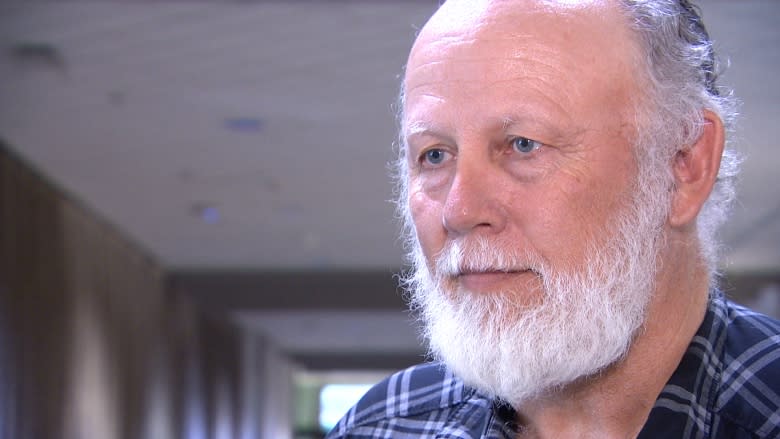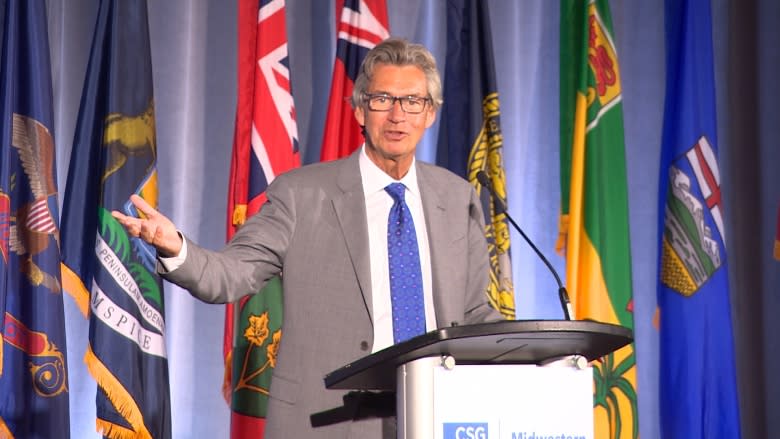'It will kill us in the long term,' North Dakota politician says about U.S-Canada trade dispute
Politicians from the U.S. Midwest and central and western Canada gathered in Winnipeg Monday to try to find regional trade solutions to counteract the negative impact of an ongoing trade dispute between the two countries.
"It's scary," Marvin Nelson, a Democrat in the North Dakota House of Representatives, who lives in Rolette County, N.D., told representatives from four Canadian provinces and 11 U.S. states that met at the Midwestern Legislative Conference.
"It's one thing if you are a farmer and you can sit on a crop for awhile. If you are another farmer in deep debt and the bank has already decided you are going to sell your crop right off the combine, you don't have very long for this trade war to work itself out before you are locking in massive losses."
Nelson said he struggles to see how the tariffs imposed June 1 by U.S. President Donald Trump on Canadian aluminum and steel help people on either side of the border.
A month later, Canadian Prime Minister Justin Trudeau followed suit by hitting back on a raft of American goods coming north across the border.
Nelson said the U.S.-Canada trade dispute comes with a "double bite" for his constituents. Many are hit by the higher costs of the aluminum and steel products they buy, plus they are now struggling with the retaliatory Canadian tariffs on food products.
"We don't need to produce all that food for the people of North Dakota. We are selling it and we are selling most of it into the world markets," Nelson told CBC News in between sessions at the conference.
As Nelson was speaking to CBC, Manitoba's Progressive Conservative MLA Cliff Graydon stopped to say hello.
Graydon, who represents the Emerson riding along the U.S.-Canada border, and his American counterpart had instant agreement – tariffs aren't good for business.
"It will kill us in the long term," Nelson said.
Both politicians said they figured the best strategy is send a message to Washington and Ottawa: tariffs are bad for business and hurt both sides.
"All the way up [the food chain] and both sides of the border," Graydon added.
The delegates started their morning session Monday with that exact advice from former Canadian Ambassador to the U.S., Gary Doer.
Doer said he's heard the same sentiment from friends, associates and contacts from all political stripes in the United States and at the Winnipeg conference.
"Everyone in this room is really worried about what the impacts of tariffs are going to be — manufacturers, the agricultural sector, folks representing consumers," Doer said.
Doer said it's critical for political representatives from both Republican and Democratic parties in the U.S. to become vocal with Washington and Trump about the tariffs.
Asked if these were scary times for relations between the two countries, Doer answered with another word.
"Uncertain. Certainty is very important to people including in the U.S. economy. We heard that loud and clear. You have a person that's owned a farm for four generations and get's up and asks the question whether he can survive for the next six months for the fifth generation," Doer said.
The conference chair, Manitoba Health Minister Kelvin Goertzen, said delegates in Winnipeg are saying that U.S. President Donald Trump is doing more harm than good.
"That is frustrating and a little bit perplexing that the dialogue coming out of Washington seems to be completely opposed to what we are hearing at the state level," Goertzen said.
If there is a result that could come from the conference in Winnipeg, it is a "trade is beneficial" message sent from state politicians to their federal counterparts in the U.S. capitol, which could be especially potent as America turns to midterm elections in the fall.
Doer wrapped up his speech to delegates reminding them they were in the birthplace of game show host Monty Hall.
"Let's make a deal on trade!" Doer said to the group.



